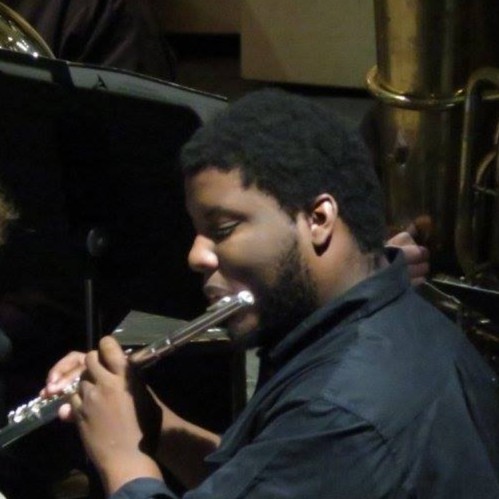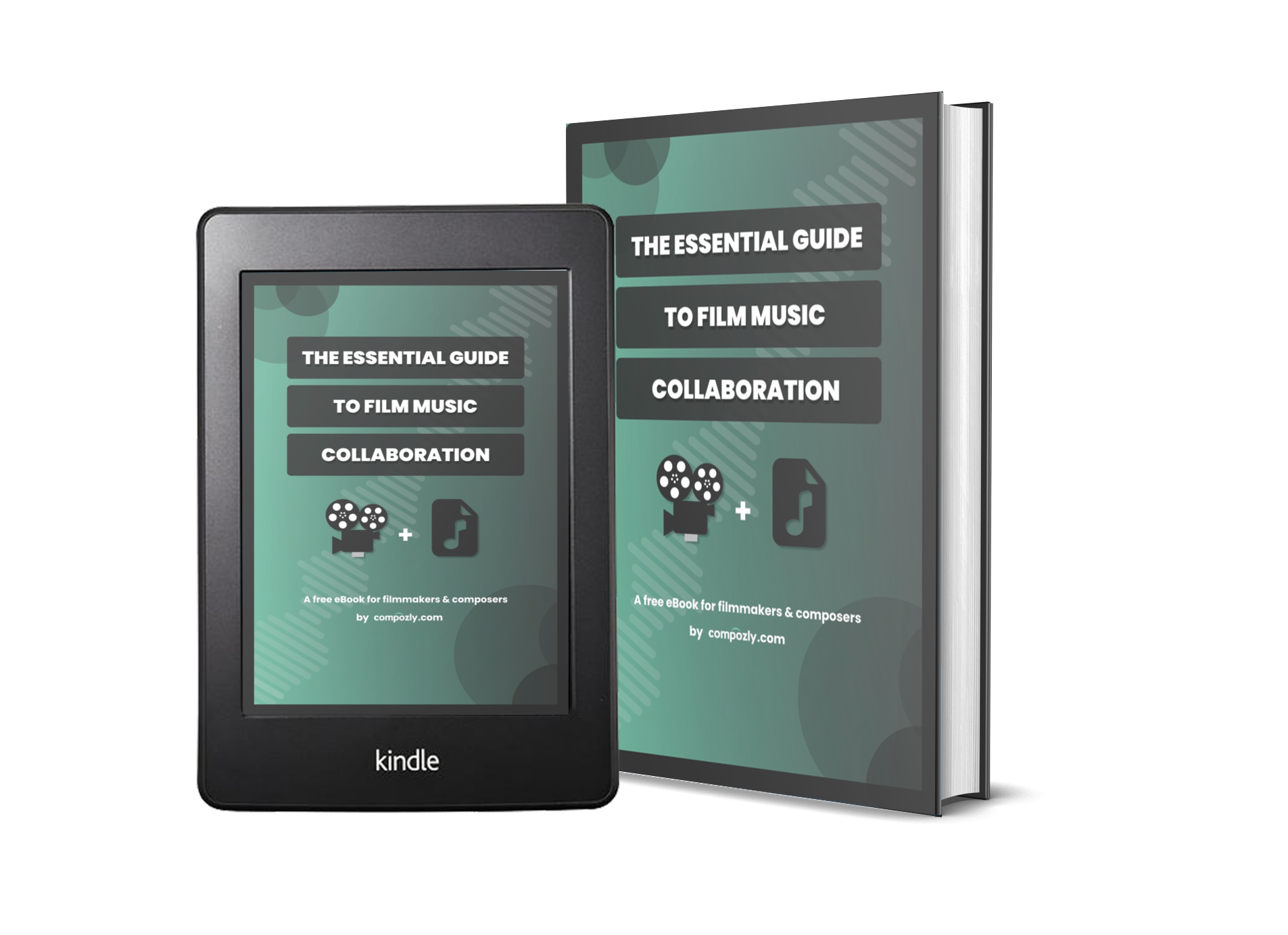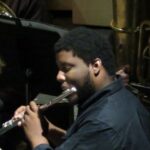Darnell Hamilton
Can you tell me about how you got into composing music?
Around 2009, I was getting immensely into ‘Star Wars‘. I was watching those movies every single day, because I enjoyed them so much.
I also started getting interested in what was going on in the background, with the score from John Williams. At the time I knew nothing about writing music, but I downloaded Finale and started messing around trying to compose my own music. It was more plagiarizing John Williams melodies and doing my own little versions.

So I wrote my very first piece and I’m like, “Okay, this is something I could do.” So all throughout high school I watched movies with soundtrack qualities that I really enjoyed like ‘Lord of the Rings‘. I think everything Howard Shore writes is gold.
Fast forward to 2018 – I came across a few music sample libraries called East West Composer Cloud and Cinematic Studio Series – which really helped develop my orchestration process.
Eventually, I migrated my writing process to Finale and added my music scores to Cubase. Once I put it all together in Cubase I was like, “Wow, this sounds really cool!”
Do you have any cool music projects you’re working on now?
At the moment, I’m not doing any projects for anybody else. I recently thought of an idea for writing a mock video game album that I’m doing currently.
It’s pretty much your classic fantasy RPG – except I’m trying to impose RPG elements in there too. I’ve been learning about the music theory and the orchestrations behind that. There are some very extended harmonies that video game music uses – so it’s actually kind of fun putting them into play.
I follow a YouTube channel called VGOScore (Video Game Orchestral Score). They do tons and tons of different covers from various video games and it is top-notch quality. I really enjoy their work.
The other channel I follow is called OrchestrationOnline. It’s another channel that’s taught my how to orchestrate my music on the fly.
Do you have standard process for orchestrating music?
So back in the day, I would just open the Finale and write whatever came to mind, go for it. Now what I’ll do is I’ll open the Finale and only do a piano reduction with two pianos. I’ll put in the melody, see how it sounds if that’s exactly what I’m hearing in my head.
Then I’ll try to formulate ideas around it by moving the melody in a different place I don’t know why I never started doing piano reductions first and then expanding the orchestration. It’s just so much easier. So I write the whole score on two pianos only before I put it into full orchestra.
What are you most proud of as an orchestrator and composer so far in your career?
It’s a piece I wrote a few years ago called the ‘Winter Wonderland March‘. I wrote that during a snowstorm in Michigan.
I just saw just the gentle snowflakes before this whole storm started and it instantly put the bug in my head for the beginning of that piece. I sat down for a couple of weeks wrote the whole thing out. It’s still my favorite piece I’ve written to this day.
What do you think makes you stand out as a composer?
I’m gonna give you two answers for this one, a joke answer and a real answer. My joke answer is whenever I am writing, I will always go to the lowest register of basses at least three times in a piece. I love the lowest ends of the bases.
Now my real answer is that I like to incorporate a lot of “Mahler” orchestration – meaning how he uses colors within his music.
I will try to incorporate “doublings” into my music. I like to be more on the early 20th Century style of orchestration and writing. That’s the sound that I like personally.
Full Audio Transcript
Can you talk to me about how you first got into composing or music?
Around 2009, I was 14, getting ready to turn 15. This was during a time in my life where I was getting immensely into Star Wars. So I was watching those movies daily during the summer in between 9th and 10th grade. And watching those movies, like once a day, every single day, because I enjoyed them so much.
And then I started getting interested in what was going on in the background, with the score from John Williams and whatnot. At the time I had known nothing about anything like writing music. I’d been in a band for a while, but I didn’t know how to make my own music.
So don’t hate me, but I pirated a company’s Finale 2009 at the time, and I started shimming around making my own music. At least at the time it was more plagiarizing John Williams melodies and doing my own little versions.
It taught me like what the melodies were and like what their note values were and like where things should go. And this is before I knew anything about orchestration. So I think to myself as I’m doing this, I’m like, this is something I could do. So I talked to my dad, you know, thinking, how cool would this be if I did this?
Cuz he himself is a bass guitar player. So he is largely self-taught. So I’d always liked hearing him practice like all over the course of when I lived with him. So we go ahead, he says it’d be a cool idea, but you know, you can’t be plagiarizing this stuff. You have to write your own stuff.
So I spent another year just messing with Williams melodies and just doing things that I think would sound cool if I did them. And then I finally had written my first original piece, I say original because it was forever ago and I look back on it now and the piece was bad, but again, it’s like my very first one.
And this is also largely, you know, without any training still at this point. So I wrote my very first piece and I’m like, okay, this is something I could do. So I talked to my band director. I asked him if he could give me some tips about how to like to use instruments in different ways.
He gave me some tips and he said also send it for a music theory class. I was like, oh, what’s that? What’s music theory? So my senior year of high school signed up for his music theory class.
So all throughout high school at this point too, I started watching more movies with more soundtrack qualities that I really liked. Like John Williams. I got huge into the Lord of the rings and I adore it. Everything Howard Shore writes is gold, and then I also got into Hans Zimmer.
And in my head, I’m like, okay, so film music is used to portray and elevate the story. So what can I do to like, get those things going for things that are in my head. And I also decided that day too, like, I’m gonna be a music major when I go to college. So my school didn’t have a composition program, so I was not able to take composition lessons.
So at first I started as a music education major, but then I changed my mind, dropped the education major. Cause I liked writing more than I did playing. So I kept writing all throughout college. I got two things done in college. Actually I had a string quartet play my song that I really wish I had gotten recorded, but at the time I was not thinking about it.
So I regret that choice. There was an orchestra piece I got to play. Part of that got recorded actually. And I still have that somewhere and I played my own piece for my senior recital. Fast forward now to when I leave college, you know, I’m kind of floating in the market right now, doing my own thing. And around 2018. A few years ago, I had come across sample libraries cuz up to this point, I had never heard of sample libraries in my life, but there were a few forums I was a part of. Wow… Forums! I was a part of one where they would show off their pieces, and I was wondering why their work sounded different from mine.
And then I came across this YouTube channel. This guy makes covers of video game music. And that was the day I found out about Spitfire and I was like, Hmm. So there are actual libraries out there where people can use almost any semi real instrument. And that raised questions in my head.
So I started exploring sample libraries and I have dumped a lot of money into sample libraries. And I started out with the first, I think this was around the time they had just started doing it with the East West Composer Cloud. That was my very first batch of sample libraries, and that is what I messed with for the longest time.
About a couple years ago, I would write my scores in Finale and then put them into Cubase. At least at the time it was Cubase elements. Put it in there, then put it all together and then was like, wow, that sounds really cool. Then again, I do way too much deep diving into YouTube. I find more sample libraries and that’s where I come across my, my flagship libraries.
I love to use the Cinematic Studio Series – They’re so good. So, those are the ones I currently use.
Would love to dive into the YouTube channels you follow. You had mentioned that there was a composer that does video game covers?
So I don’t know their name specifically, but the YouTube channel is VGOScore (Video Game Orchestral Score). They do tons and tons of different covers from various video games and it is topnotch quality. I really enjoy their work. I believe the other channel I follow is called Orchestration Online. It’s another one about how I learned most of my orchestration stuff on the fly, my band director Dr. Marks, Dr. Marty Marks, who is now a teacher in Oklahoma, was very, very, very intelligent with his arranging and writing. I think he got either his Master’s or his Doctorate in woodwind arranging. Very, very intelligent man. Very, very amazing teacher. And I honestly do miss him a lot.
So do you have any projects lined up that you’re looking to share?
So at the moment, I’m not doing any projects for anybody, except just for myself in my head. I came across an idea for writing a mock video game album that I’m doing currently. Pretty much like your classic fantasy RPG, except I’m trying to impose like some RPG elements in there too. So I’ve been learning about the theory and the orchestrations behind that. Some very extended harmonies that those games use and it’s actually kind of fun, putting ’em into play.
I would love to pick your brain and understand your process for how you go about composing a piece of music, whether it’s for this upcoming album you’re working on, or just stuff that you’ve done in the past. Do you have a common sort of like, or a consistent way of putting that music together?
So back in the day, I would just open the Finale and just whatever came to mind, go for it. I can’t do that any more. However, now sometimes I’ll get a little bug in my head as my, as a friend of mine would say, you get a little bug in your head. What you do is you, you take that bug and write it down.
Now what I’ll do is I’ll open the Finale and only do a piano reduction with two pianos. I’ll put in like the melody, see how it sounds if that’s exactly what I’m hearing in my head. And then I’ll try to formulate things around it and maybe move the melody in a different place if I don’t want it right at the beginning. I don’t know why I never started doing piano reductions first and then expanding the orchestration. It’s just so much easier. So I write the whole score on two pianos only before I put it into full orchestra.
What do you think makes you stand out as a composer? What about your music is kind of unique and I guess, native to you or your sound?
So I’m gonna give you two answers for this one, a joke answer and a real answer. My joke answer is whenever I am writing, I will always at least three times in a piece go to the lowest register of basses, always. Cause I love the lowest ends of the bases. Now my real answer, of course. I like to incorporate a lot of Moler orchestration into my music, meaning, not like the full nonsense of what he would do, but like the way he uses colors, I really love the way Moler used colors in his music.
And I will try to like, do some of those, like doublings that he did in my music. I like to be more on the early 20th century like orchestration and writing. That’s the sound that I like personally.
What are you most proud of as an orchestrator and composer so far in your career? Is there a particular piece of music that you’ve written that you’re like, Hey, this is my best work or top two pieces of music?
I actually do. And it’s a piece I wrote a few years ago. It’s called the Winter Wonderland March. I wrote that during a snowstorm in Michigan and it was just something about the storm that had happened somewhere in the middle of the night and I happened to be awake and I looked out my window.
At my dad’s house. And I just saw just the gentle snowflakes before this whole storm started. And it instantly put the bug in my head for that, for the beginning of that piece. And I sat down for like a couple of weeks and I wrote the whole thing out and it’s still my favorite piece I’ve written to this day.
As a composer or as an orchestrator, what are your career goals?
So one of the big ones obviously is, I want just a score for just one feature film, just only one.
I would love to be able to do that. Another is I would actually like to become a full-time orchestrator. Cause I would argue that my skills in orchestration are better than my actual composing. And then my other one is my friend and I. We would love to meet each other in person and both get nominated for something at the video game awards.
Do you have a particular video game score?
Oh yeah. So it’s a Super Nintendo game called Chrono Trigger.
It is my favorite game of all time. I have the soundtrack saved on my Spotify because it’s the game that had a profound impact on my life in terms of what I like when it comes to gaming.
To anyone out there who is looking for a composer, such as myself, who ends more on the classical side, I enjoy working with directors. This one guy I worked with did a project together. He did a silent film suite, a mini film series called Unspeakable Acts. And I was in charge of writing music for that.
Him and I would communicate with each other and we had the same ideas on certain things and it was great to kind of like click with him. And that project was fun and writing jazz was hard, I learned that day too. It’s hard now. Now I know how to do it. But back then, when that was my very first time, it took me 12 hours to write a jazz line for that video.
And I was so mad at the end of it. I was like, oh God, what have I done? No, it was great. I really, really hope to be able to like work on more things in the future and like to expand my creative palette. So if anyone needs any orchestral music, I can do synthwave too, along with jazz and funk.
What are some of the ways in which you’re trying to find consistent paying, scoring gigs?
Right now I mainly reach out to people on various Facebook groups.
It’s just like throwing some stones out there being like, Hey, pick me. And sometimes it lands and sometimes it doesn’t, but if it doesn’t, move on to the next one. I’ll get the next one. You keep telling yourself, I’ll get the next one and eventually you’ll get it.
Are you a music composer?
Join the composer community by quickly creating your free Compozly profile Create my account
Get your FREE copy of "The Essential Guide to Film Music Collaboration" to help create better music for your film and video projects.
© 2025 Compozly, LLC ALL RIGHTS RESERVED

